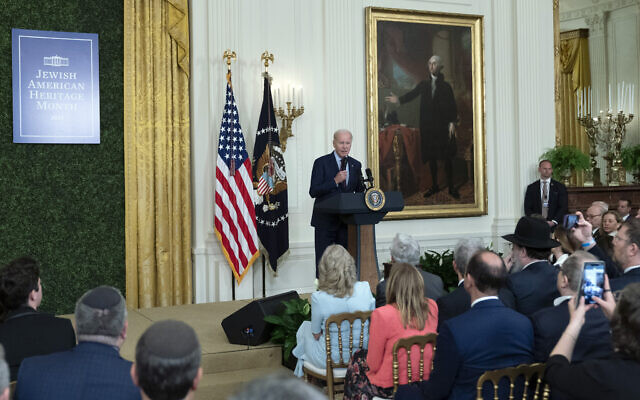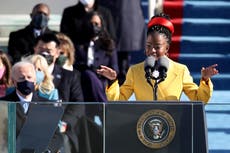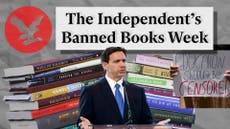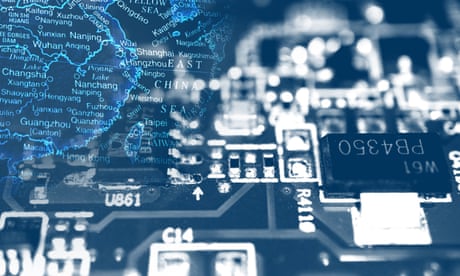Recommended steps include raising awareness of antisemitism now and in the past, expanding knowledge of Jewish heritage in the US
By PAMELA S. NADELL

Antisemites hang a banner over a Los Angeles freeway declaring 'Kanye is right about the Jews' next to another advertising the Goyim Defense League's Goyim TV website.
THE CONVERSATION via AP — As reported antisemitic incidents in the US in 2022 soared to an all-time high, the White House began developing plans to combat this hate, proclaiming in an official statement, “antisemitism has no place in America.”
The US National Strategy to Counter Antisemitism, released on May 25, 2023, was based on conversations with more than a thousand stakeholders, including me, a scholar of American Jewish history. The plan outlines over 100 steps for federal agencies to take in the coming year and calls upon Congress, state and local governments and the private sector to join them. Understanding that history matters, those steps include raising awareness of antisemitism in the present and the past, and expanding knowledge of Jewish heritage in the US.
That heritage has two sides. Its bright side honors the achievements of America’s Jews and their many contributions to this nation. Its darker side contains a long history of antisemitism from Colonial days to today.
Governors, generals and members of Congress
During the recent celebration marking Jewish American Heritage Month at the White House, Jewish accomplishments were spotlighted. Michaela Diamond and Ben Platt, stars of the Broadway revival of the musical “Parade,” performed. That these actors, the show’s book writer, Alfred Uhry, and its composer, Jason Robert Brown, are all Jewish attests to Jews’ presence and contributions to American theater, the arts and beyond.
Yet “Parade” tells the story of one terrible episode in the history of American antisemitism.

US President Joe Biden speaks during the celebration of Jewish American Heritage Month in the East Room of the White House, Tuesday, May 16, 2023, in Washington. (AP/Manuel Balce Ceneta)
In 1913, Leo Frank, the manager of an Atlanta pencil factory and a Jew, was accused of having murdered one of his teenage workers. Frank maintained his innocence, and the trial became a national media circus.
Mobs gathered outside the courtroom. Frank’s attorney told the court, had Frank not been a Jew, he never would have been prosecuted.
Even as the trial judge questioned Frank’s guilt, the jury convicted him, and Frank was sentenced to hang. Two years later, after Georgia’s governor commuted that sentence to life imprisonment, a gang of vigilantes, without firing a shot, kidnapped Frank from jail and lynched him.

Leo Frank. (Public domain/Wikipedia)
Antisemitism had arrived in America 250 years before Leo Frank’s murder. In September 1654, after 23 Jewish refugees fleeing the persecution in colonial Brazil landed in Manhattan, the colony’s governor, Peter Stuyvesant, tried to eject this “deceitful race” of “blasphemers” and “enemies.”
He failed.
Yet during the Civil War, Gen. Ulysses S. Grant did expel Jews from his military district, the District of the Tennessee, which spanned from the southern tip of Illinois to the Gulf of Mexico, an order President Abraham Lincoln countermanded.
In the 1940s, Rep. John Rankin, a Democrat from Mississippi, railed against the Jews from the House floor, claiming that Jews “have been for 1,900 years trying to destroy Christianity, and everything that is based on Christian principles.”
They had already “virtually destroyed Europe,” ranted Rankin, and were now doing the same to America.
‘Misfortune’ to be a Jew
Powerful voices from the private sector joined governors, generals and members of Congress in spouting antisemitism.
In May 1920, the newspaper The Dearborn Independent, owned by the automobile tycoon Henry Ford, ran the headline “The International Jew: The World’s Problem.” For the next 91 weeks, the weekly ran a series of articles decrying Jewish power and Jews’ dangerous influence on American life.
The paper’s circulation soared as copies were distributed in every Ford dealership and sent to every member of Congress.

German diplomats award Henry Ford, center, Nazi Germany’s highest decoration for foreigners, The Grand Cross of the German Eagle, in Detroit on July, 30, 1938, for his service to the Third Reich. Karl Kapp, German consul in Cleveland pins the medal while Fritz Heiler, left, German consul in Detroit shakes his hand. (AP Photo/file)
Encounters with antisemitism, and not only those from public figures, linger in the memories of American Jews. My book “America’s Jewish Women: A History from Colonial Times to Today” highlighted some of them. In the 1880s, a Philadelphia writer ruefully recalled a teacher saying: “It is your misfortune, not your fault, that you are a Jew.”
In 1945, just days after World War II ended, Bess Myerson, a Jewish woman from the Bronx, was crowned Miss America. Heading out on tour after the pageant, this Miss America was turned away from what were called “restricted” hotels, which did not admit Jews. Three of the pageant’s sponsors refused to feature a Jewish Miss America in their ads.

In this September 8, 1945 file photo, Bess Myerson, of New York, holds the scepter after being crowned Miss America 1945 at the annual Miss America pageant in Atlantic City, N.J. Myerson, the first Jewish Miss America who parlayed her stunning 1945 victory into national celebrity, died December 14, 2014, at her home in Santa Monica, Calif. She was 90. (photo credit: AP)
Myerson spent part of her year wearing her crown speaking out against antisemitism. Meanwhile, returning American GIs who had liberated the concentration camps had seen with their own eyes just where antisemitism could lead.
The antisemitism the White House hopes to combat today rests on this history and much more.
The White House plan comes just as the trial of the man accused of the deadliest hate crime against American Jews, the murder of 11 worshippers in a Pittsburgh synagogue in October 2018, gets underway.
Pamela S. Nadell, American University

President Joe Biden’s administration has announced a national strategy, the nation’s first, for combating antisemitism, with a call to action across government agencies, law enforcement and other institutions against a reported wave of discrimination and proliferation of online hate.
“It sends a clear and forceful message: In America, evil will not win. Hate will not prevail,” the president said in a prerecorded message shared on 25 May. “The venom of antisemitism will not be the story of our time.”
Sharing a video of the announcement, Republican US Rep Lauren Boebert said the plan would instead be used to target “conservatives” like her.
“When they say stuff like this, they mean they want to go after conservatives,” she wrote on Twitter on 26 May. “Their tactics are straight out of the USSR’s playbook.”
Her critics were quick to point out that she was conflating a campaign against hate with an attack on the American right, an echo of other far-right criticism against attempts to combat hate speech, white supremacism and violent extremist groups.
Democratic US Rep Sara Jacobs shared Ms Boebert’s post with a meme from Mean Girls, with the caption: “So you agree? You think you’re antisemitic?”
“Congresswoman Boebert is mistaken; antisemitism is not ‘conservative’ – it is evil,” deputy White House deputy press secretary Andrew Bates told The Independent.
“President Biden is standing up for a bedrock American value that goes beyond politics and is embraced by liberals, conservatives, and independents: that we are better than antisemitism and hate,” he added. “Those vile forces fly in the face of what America represents. If anyone finds opposition to hate threatening, they need to look inward.”
Mr Bates also suggested that Ms Boebert study the history of the Soviet Union’s “long, repulsive history of antisemitism” – a regime that the president also has condemned.
In a statement to The Washington Post, Ms Boebert’s office condemned antisemitism and charactised the Biden plan as an attempt to censor speech.
“This is the latest version of this administration’s failed ‘Ministry of Truth,’” Ms Boebert said in the statement. “The First Amendment guarantees a marketplace of ideas where truth, beauty, and justice ultimately win out.”
“If the congresswoman believes efforts to combat antisemitism are a way to ‘go after conservatives’,” said Jonathan Reiner, a professor of medicine and surgery at George Washington University School of Medicine & Health Sciences, “then what does that say about conservatives?”
The Independent has requested additional comment from Ms Boebert’s office.
In 2022, there were 3,697 reported incidents of antisemitic assault, harassment and vandalism in the US, according to the Anti-Defamation League. That figure marks a 36 per cent increase from 2021, and represents the largest number of attacks against Jewish people in the US since the organisation began reporting such incidents more than 40 years ago.
The Biden administration’s plan – with input from hundreds of federal and local officials, faith leaders and civil rights groups, among others – includes more than 100 recommendations for policy changes and congressional action, among other steps.
It also includes 10 separate calls for technology companies to bolster zero-tolerance policies against hate speech and to combat the spread of antisemitic language across their platforms.
Democratic Senator Jacky Rosen, co-chair of the Senate and House Bipartisan Task Forces for Combating Antisemitism, said the “whole-of-government approach” will “effectively utilize the full force of the United States government to root out antisemitic hate across our nation.”










